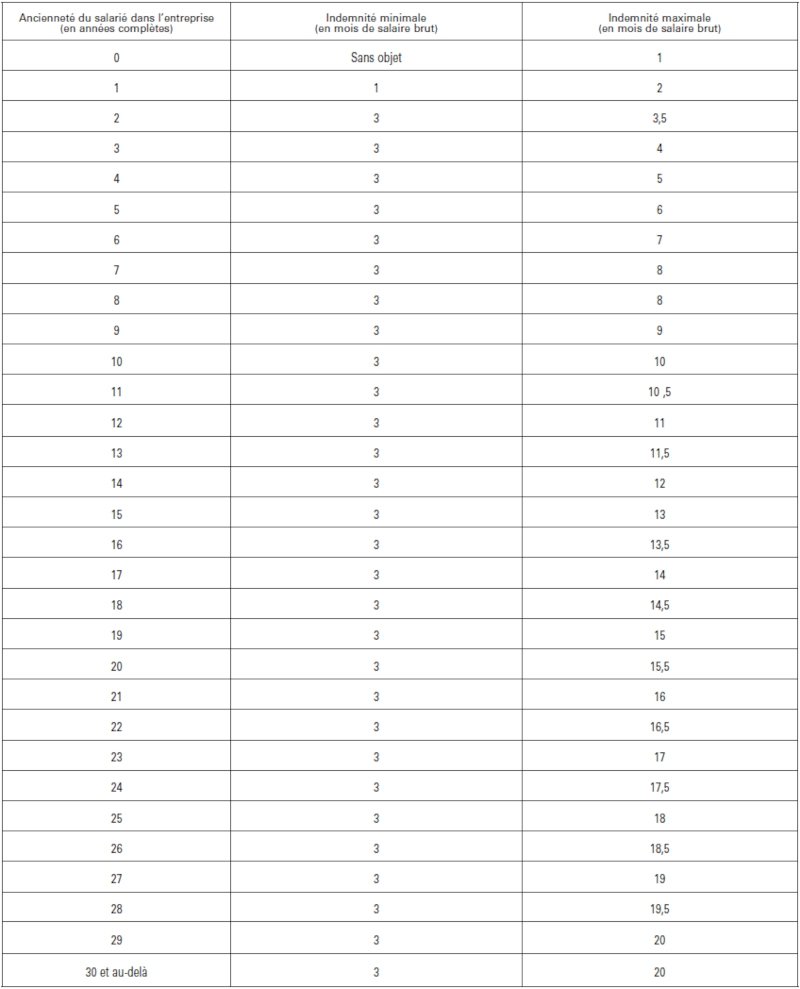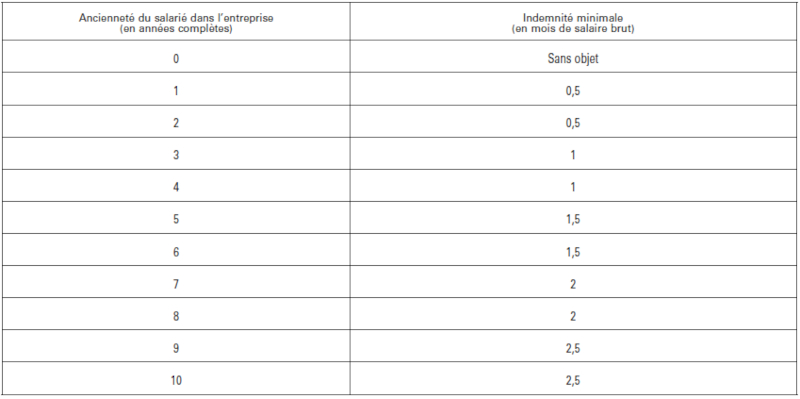The Court of Cassation validates the scale of indemnities due in case of irregular dismissal or dismissal without real and serious cause of an employee.
Article L1235-3 of the Labour Code revised in 3 acts!
I validation of the Macron Ordinances by Article 45 of the 1958 Constitution
II validation of the Macron Ordinances by the Constitutional Council in 2018
III validation by the Court of Cassation on 11 May 2022: the coup de théâtre!
And an epilogue...
The development of the redundancy payment as ordered by the Labour Court has varied considerably in recent years.
Act I: the ancestor of the Macron scale
Before 2017, employees could claim as many damages as they wished before the social courts, namely the Conseil de Prud'hommes, the Social Chamber of the Courts of Appeal and the Social Chamber of the Cour de Cassation.
To claim is not to obtain, however. However, thanks to their lawyer and the social courts, provided that their file was well documented - written proof is king in law - a dismissal without real and serious cause allowed them to fulfil their scholarships. Indeed, it was almost enough to have two years' seniority to obtain, in particular from the Conseil de Prud'hommes, a sum equivalent to six months' gross salary in the form of damages, based obviously on the employee's remuneration.
The Article L1235-3 of the Labour Code in force until 24 September 2017 provided indeed:
"If the dismissal of an employee occurs for a reason that is not real and serious, the judge may propose the reinstatement of the employee in the company, with the maintenance of his acquired benefits. If either party refuses, the judge grants compensation to the employee. This compensation, to be paid by the employer, cannot be less than the salaries of the last six months. It is due without prejudice, where applicable, to the redundancy compensation provided for in Article L. 1234-9.
Thus, it was also sufficient to justify a so-called special prejudice, relating for example to the age at which one was dismissed, in order to obtain in addition to the equivalent of 6 months' salary in the form of damages which, it should be remembered, are only subject to the deductions of the CSG (social security contribution) and the CRDS (Contribution to the Repayment of the Social Debt), to obtain further damages in accordance with the former Articles 1382 (applicable until October 1st, 2016), 1148 and 1153 of the Civil Code.
Very large sums of money could thus put the employer in a very difficult situation, which could even lead to bankruptcy, in a word. Some have therefore decreed that the destruction of the economic fabric must be stopped. Others have said that the courts are overloaded.
Act II: the Macron scale validated by the Constitutional Council
By ordinances (known as Macron due to the fact that they were established at the beginning of Emmanuel Macron's first presidential term) dated September 24, 2017 taken in application of Article 38 of the Constitution of October 4, 1958, the system of awarding damages in the event of unfair dismissal was reformed in a profound way. Never before has such a major overhaul of the Labor Code been carried out in less than 7 months than with these ordinances, to be convinced of this it is sufficient to know that:
- From July 4 to July 17, 2017: Presentation of the enabling bill to the Social Affairs Committee of the National Assembly, followed by debate in the National Assembly;
- July 18-27: Consideration of the Enabling Bill in the Senate;
- August 2, 2017: Adoption of the Enabling Act to take measures to strengthen social dialogue by ordinance;
- August 31, 2017: announcement of the content of the ordinances: what a summer!
- September 7, 2017: Constitutional Council ruling that the Enabling Act complies with the Constitution;
- September 15, 2017: Promulgation of the Enabling Act to take measures to strengthen social dialogue by ordinance;
- September 22, 2017: Promulgation of the ordinances with immediate entry into force on September 24, 2017 (the day after publication in the Official Journal);
- September 25, 2017 : Decree no. 2017-1398 revalorising the legal redundancy allowance;
- October 2017: Publication of the decrees and presentation to Parliament of the bill to ratify the ordinances.
For your information, the average time it takes to enact legislation is 13 months. You will appreciate... but many indicate that these Macron ordinances were passed by force: the articles 45 and 49-3 of the constitution of the Fifth Republic allow it.
In any case, the minimum and maximum amounts of the prud'homale indemnity vary from September 2017, depending on:
1. the employee's seniority;
2. the size of the company.
A simple spreadsheet allows from now on in case of less than one year of seniority, to obtain 1 month of the equivalent of its monthly gross salary, if the company had more than 11 employees. If one has obviously 30 years of seniority or more, it was a minimum of 3 to 20 months of salary, the figures climbed but not enough in the eyes of some. The fact remains that only the second part of thearticle L1235-3 of the Labor Code was amended to:
"If the dismissal of an employee occurs for a reason that is not real and serious, the judge may propose the reinstatement of the employee in the company, with the maintenance of his acquired benefits. If either party refuses this reinstatement, the judge shall award the employee an indemnity to be paid by the employer, the amount of which shall be between the minimum and maximum amounts set out in the table below."
However, the scale (table) has been called into question for several reasons, starting with the substitution of the executive (President of the Republic and Government) for the legislative power (National Assembly and Senate), both judged by the judicial power. This is the balance dear to Montesquieu in his " Esprit des lois » qui peut en effet être considéré comme menacé.
Thus, since September 2018, on several occasions, Conseils de Prud'hommes (CPH) have censured the compensation scale for unjustified dismissal considering that it violates the European Social Charter and the ILO Convention No. 158 (International Labour Organisation). Indeed, the judges considered that the ceiling of the labour tribunal's compensation did not allow for a global assessment of the individual situations of unjustly dismissed employees and for a fair compensation of the prejudice they suffered. They also deplored the fact that these scales were not dissuasive enough for employers.
For example, a court rebellion against the Macron Ordinances has clearly emerged, with the Amiens CPH (Somme) awarding an employee 3 months' salary (instead of 1 month under the scale). The CPH of Angers (Maine-et-Loire) compensated an employee with 12 years and 9 months of seniority with 12 months of salary (the applicable scale provided for between 3 and 11 months). The list is long: the question was in fact whether employees could obtain additional compensation in addition to the Macron scale (special prejudice independent of redundancy payments).
The answer is yes and must be taken from two angles: a Norman answer! Firstly, the texts provide that the scale can be set aside in certain cases: for example, the judges can declare the dismissal null and void if the facts complained of are linked to moral or sexual harassment. On the other hand, if the dismissal is discriminatory, i.e. if it was motivated by a criterion of age, sex, origin, etc., or if the breaches of contract infringe on fundamental freedoms, such as the employee's freedom of expression, the right to privacy; the judge may in these cases award compensation above the ceilings. Secondly, some damages are not included in the scale: this is the case in particular if the employee demonstrates a moral prejudice distinct from the wrongful dismissal. As a simple example, the CPH of Troyes (Aube) awarded compensation for moral prejudice due to the brutal and vexatious circumstances surrounding the termination (impoverishment of the employee's missions, "putting him in the wardrobe").
In addition, an employee may claim damages related to the delay or non-payment of salary, or to the failure to communicate the criteria for dismissal. He can also obtain sums related to the performance of the employment contract: back pay, non-competition clause, reimbursement of expenses, etc.
The CPHs of Louviers (Eure) and Toulouse (Haute-Garonne) then referred the matter to the Court of Cassation under the opinion procedure. In the course of litigation, the judge may be confronted with a new legal issue that poses a particular difficulty of interpretation. In such cases, the court may ask the supreme court to clarify the issue before handing down its decision. This is what has happened.
As a reminder, it should be noted that:
- The Constitutional Council validated this mechanism as part of the appeal against the law ratifying the ordinance (Decision No. 2018-761 DC of March 21, 2018). However, we know that the Constitutional Council only rules on the conformity of a law with the Constitution and not with regard to international texts. The fact remains that article L1235-1 of the code of work has thus been modified again as of April 1st, 2018.
- On 7 December 2017, the Conseil d'Etat rejected an argument identical in every respect to the one invoked before the labour courts to invalidate the scale (CE Réf. Ord. 7 December 2017, n°415.243).
So only the Court of Cassation remained, whose first decision was rendered on July 17, 2019. On the one hand, the Court of Cassation accepted, for the first time and going back on its case law, to take a position on the conventionality of a text within the framework of an opinion procedure and, on the other hand, it validates the scale.
Act III: the Court of Cassation ruling of 11 May 2022
The Court of Cassation therefore considered in its decision of May 11, 2022 that the judges were required to apply the scale limiting industrial tribunal compensation in the event of unfair dismissal, introduced by the 2017 Labor Code reform. The Court indicates that the scale was not "not contrary" to Article 10 of Convention No. 158 of the International Labor Organization and ruled out the possibility of derogating "even on a case-by-case basis" from the application of the scale, according to a press release from the court explaining its decision.
The Court also considers that the Macron scale allows for "adequate" compensation and is sufficiently "dissuasive" in case of dismissal without real and serious cause. It should be remembered that the judge also has a margin of appreciation since the scale sets a minimum compensation level and a maximum.
Quid about Act IV? The last?
The next grooming: the constitution of the Fifth Republic, so dear to the late Charles-de-Gaulle? A forthcoming ruling by the Court of Cassation?


